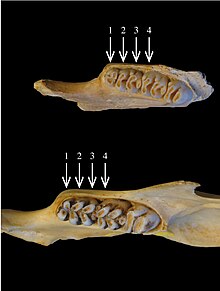Verhoeven's giant rat
Appearance
(Redirected from Papagomys theodorverhoeveni)
| Verhoeven's giant tree rat Temporal range: Holocene
| |
|---|---|

| |
| Holotypes of Papagomys theodorverhoeveni (above) and Papagomys armandvillei (below), with four diagnostic characters marked | |
| Scientific classification | |
| Domain: | Eukaryota |
| Kingdom: | Animalia |
| Phylum: | Chordata |
| Class: | Mammalia |
| Order: | Rodentia |
| Family: | Muridae |
| Genus: | Papagomys |
| Species: | P. theodorverhoeveni
|
| Binomial name | |
| Papagomys theodorverhoeveni Musser, 1981
| |
Verhoeven's giant rat (Papagomys theodorverhoeveni) is an extinct rat of subfamily Murinae that lived on Flores in Indonesia.[1] It was judged to be extinct in 1996. However, experts believe that it died out before 1500 AD. The species is known only from several subfossil fragments. It was named after Dutch priest Theodor Verhoeven. A 1974 report of a recent specimen has been judged to represent P. armandvillei instead.[2] It was somewhat smaller than P. armandivillei, with an estimated body mass of around 0.6–1.6 kilograms (1.3–3.5 lb). It is assumed to have been terrestrial, and to have been an omnivore, consuming fruit and invertebrates.[3]
References
[edit]- ^ Musser, G. G.; Carleton, M. D. (2005). "Superfamily Muroidea". In Wilson, D. E.; Reeder, D. M. (eds.). Mammal Species of the World: A Taxonomic and Geographic Reference (3rd ed.). Johns Hopkins University Press. p. 1430. ISBN 978-0-8018-8221-0. OCLC 62265494.
- ^ Gerrie, R.; Kennerley, R. (2017). "Papagomys armandvillei". IUCN Red List of Threatened Species. 2017: e.T15975A22399875. Retrieved 27 December 2019.
- ^ Veatch, E. Grace; Tocheri, Matthew W.; Sutikna, Thomas; McGrath, Kate; Wahyu Saptomo, E.; Jatmiko; Helgen, Kristofer M. (May 2019). "Temporal shifts in the distribution of murine rodent body size classes at Liang Bua (Flores, Indonesia) reveal new insights into the paleoecology of Homo floresiensis and associated fauna". Journal of Human Evolution. 130: 45–60. doi:10.1016/j.jhevol.2019.02.002. hdl:2440/121139. PMID 31010543.
Further reading
[edit]- Zijlstra, J. S.; van den Hoek Ostende, L. W.; Due, R. A. (2008). "Verhoeven's giant rat of Flores (Papagomys theodorverhoeveni, Muridae) extinct after all?". Contributions to Zoology. 77 (1): 25–31. doi:10.1163/18759866-07701004. S2CID 54840179.
